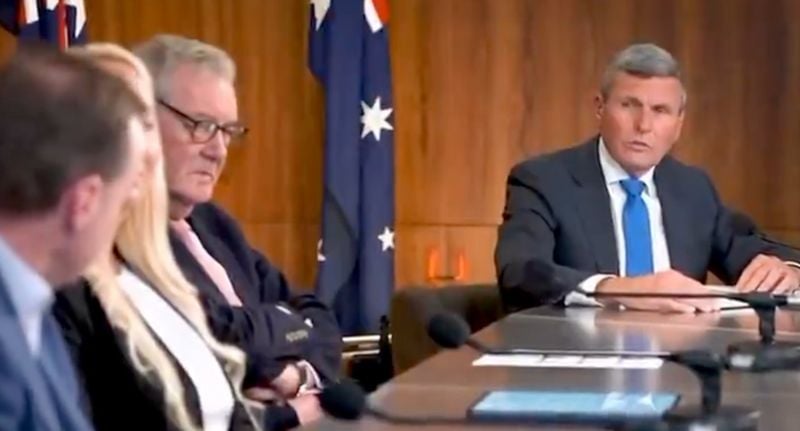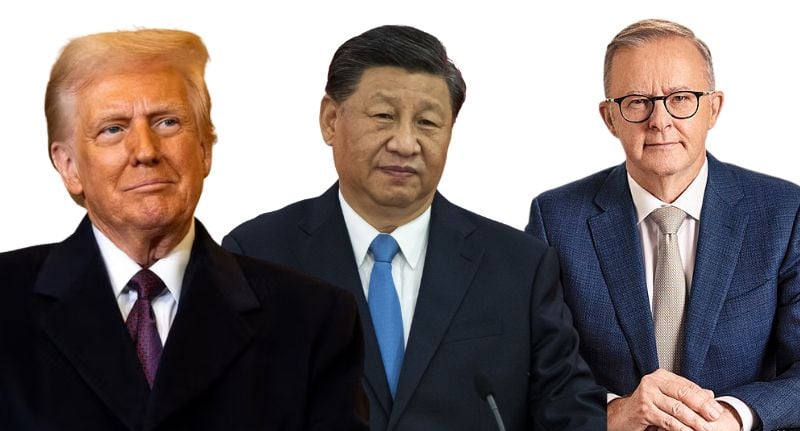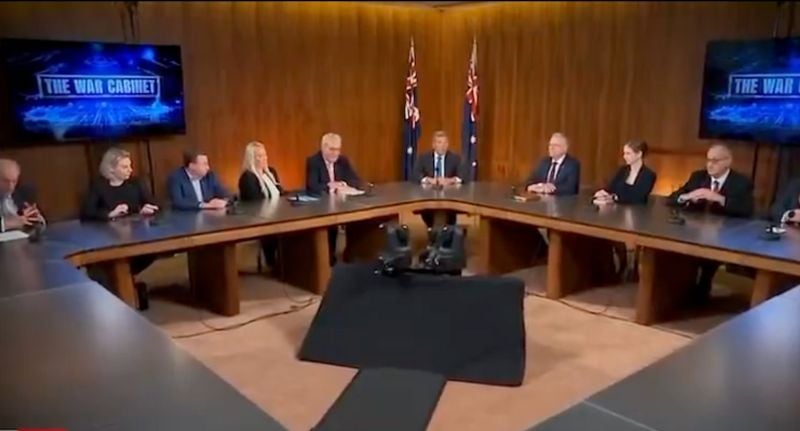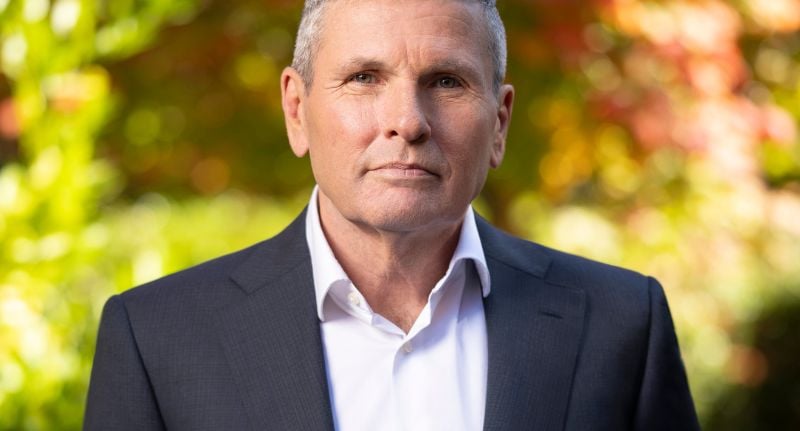With China’s military power rising, America’s global posture shifting, and the rules-based order under strain, Sky News will address it head-on in The War Cabinet, a one-hour live special airing tonight at 7.30pm AEST, hosted by award-winning journalist and Sky News political contributor Chris Uhlmann.
Set inside the Cabinet Room of Old Parliament House – the same space where John Curtin steered Australia through the Second World War – the program brings together former ministers, military leaders, and national security experts for a high-stakes conversation about whether Australia could defend itself and support its allies in the face of major regional conflict.
“The War Cabinet will return to the heart of Old Parliament House, where John Curtin and his ministers steered the nation through World War II,” Uhlmann said.
“Today, with China rising, America shifting, and the global order fragmenting, the threat of major conflict in our region looms once again. We bring together former ministers, defence leaders, and national security experts around the Cabinet table to answer a single question: is Australia ready for war?”

Chris Ulhmann leading the War Cabinet in the Sky News Australia special
From documentary idea to live debate
The project began life as something very different.
“We were thinking about doing a documentary, which was Sky and I, about whether or not Australia is ready for war,” Uhlmann explained. “But with the landscape changing so rapidly, we talked about how we might do it. And Mark Calvert from Sky came up with the idea of essentially trying to do it live.”
The live format allows for a frank, unscripted exchange.
“Get a panel together of people who were really well-credentialed in their fields and put this question to them and have them debate it as you would in a War Cabinet. So it’s Mark’s idea to do it, and I think it’s very ambitious in its scope.”
For Uhlmann, the ambition isn’t just in the format – it’s in the purpose.
“It is an intelligent national conversation with people of great standing which raises some very serious questions,” he said. “It is mainly to start a conversation, right? No sane person wants a war. Everybody hopes for peace but hope isn’t a strategy.”
He acknowledges the sensitivities. “This is a very contested space and there will be a great many people who will disagree with what this panel has to say but that doesn’t mean that we shouldn’t be having a conversation.”
An unmatched panel of experts
The special’s credibility, Uhlmann believes, comes from the calibre of the people in the room. “They were all really enthusiastic about it, which is a great credit to them,” he said.
The line-up includes former Foreign Affairs Minister Alexander Downer, former Defence Minister Joel Fitzgibbon, Strategic Analysis Australia director Peter Jennings, and former Secretary of the Department of Home Affairs Michael Pezzullo. Other participants bring deep technical and operational knowledge: defence aviation expert Dr Oleksandra Molloy, cyber security specialist Katherine Mansted, Strategic Forum CEO Dr Ross Babbage, defence expert Jennifer Parker, and retired Major General Mick Ryan.
Uhlmann is particularly proud of the diversity of expertise: “You really couldn’t get a group of people who were more informed. And also, too, I think they see it as part of their national duty to be part of this conversation.”

Donald Trump, Xi Jingpin, and Anthony Albanese
Cyber warfare and the ‘grey zone’
One of the more confronting topics on the table is the question of whether hostilities with China are already underway in the cyber domain. “You could ask Katherine [Mansted] the question, are we already at war? And she says that’s a reasonable question,” Uhlmann said.
He pointed to evidence suggesting that “China has placed virtual bombs on our critical infrastructure, so things like our electricity supply. If push came to shove with China, those things are there now and could be detonated now.”
For Uhlmann, the challenge is that this “grey zone” makes it harder for the public to see the scale of the threat. “If a country was placing a bomb on the Sydney Harbour Bridge, you’d say that was absolutely an act of war,” he said.
“But in the new world that we face, this is one of those areas where it’s very difficult to discern sometimes who the aggressor is, what their intentions are. And to do great damage is absolutely enormous. Asking these hard questions is really what good journalism is about and what good shows like this are about.”
From noise to informed insight
In an era of endless commentary, Uhlmann believes the key is cutting through to real expertise.
“One of the things I think is that there are swings and roundabouts with the new era, the information age that we are in. There’s an enormous amount of noise but quite often not a lot of information involved in that,” he said.
“There’s also an enormous amount of opinion, but in this instance, we’re drawing on the opinions of people who have real-world experience. These are people who can offer genuine advice and an understanding.”
Complacency and the threat from China
When it comes to strategic risk, Uhlmann said one consensus emerged: “We are failing to read the signs of the times to respond rapidly enough to the circumstances in which we find ourselves and we are incredibly complacent, that we don’t really believe that the threat is real.”
In his own assessment, Beijing is preparing for the possibility of conflict.
“It’s rapidly expanding its navy, its air force and its missile arsenal. It’s already planted virtual bombs on our critical infrastructure. It’s also stockpiling food, fuel and critical minerals to ensure they can stand alone in a prolonged conflict.”
Trying to remain silent, he argued, is “a fool’s errand”.
Uhlmann explains: “If the government wants the Australian people to be up for spending more money on defence, they have to recognise that there’s a problem. At the moment, we’re not talking to them about the problem. We need to be having a sensible adult conversation with the Australian public and telling them about what the real risks are.”

A scene from Sky New Australia’s ‘War Cabinet’
The US alliance and strategic posture
Another focus will be Australia’s balancing act between Beijing and Washington.
While Australia has been slow to build its own defence capabilities, Uhlmann noted that “what we have been doing is gradually building up the American defence presence here. So it started with marines in Darwin but it’s going to continue to expand with ship visits and then ships being stationed here and more and more American personnel being stationed here.”
This sits alongside what he sees as mixed messaging from Canberra.
“While it whispers sweet nothings to Beijing, it’s determined to speak loudly and wave a small stick at Washington,” he said.
“While we are boldly asserting our independence from Donald Trump, we’re quietly sheltering underneath America’s security umbrella. It’s a peculiar posture, isn’t it? A defiant in word, dependent indeed, bold talk in Canberra and quiet reliance.”
For Uhlmann, the motivation is straightforward: “Sometimes you don’t get a choice, sometimes trouble chooses you. Any preparation has to begin with telling the truth and it’s as simple as that.”
Where to watch
The War Cabinet
Monday 11 August at 7.30pm AEST on Sky News Australia
Stream at skynews.com.au
